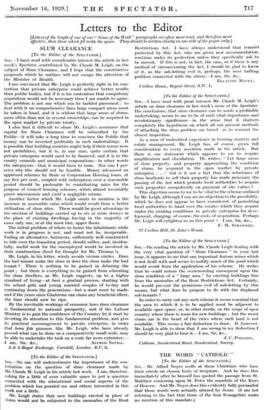Letters to the Editor
[Letters of the length of one of our" News of the Week" paragraphs are often snore read, and therefore more effective, than those which fill treble the space. They should be written clearly on one side of the paper only.]
SLUM CLEARANCE
[To the Editor of the SPECTATOR.] SIR,—I have read with considerable interest the article in last week's Spectator, contributed by Mr. Claude M. Leigh, on the subject of Slum Clearance, and I hope that the constructive proposals which he outlines will not escape the attention of the Minister of Health.
• I am convinced that Mr. Leigh is perfectly right in his con- tention that private enterprise could achieve better results than public bodies, but if it is his contention that compulsory acquisition would not be necessary then I am unable to agree. The problem is not one which can be tackled piecemeal ; to deal with it on comprehensive lines large compact areas must be taken in hand, and it is seldom that large areas of slums, more often than not in several ownerships, can be acquired in the open market by private treaty.
I also find it difficult to share Mr. Leigh's assurance that capital for Slum Clearance will be subscribed by the Public—it will take a long time to convince the Public that money can be invested profitably in such undertakings. It is possible that building societies might help if their terms were not prohibitive, but it is, in - any case, quite certain that private enterprise would need to be financed, and it is to the county councils- and municipal corporations—in other words the ratepayers—that it would have to turn. Nor can I per- ceive why this should not be feasible. Money advanced on approved schemes by State or Corporation Housing loans, at say five per cent., coupled with redemption over a reasonable period should- be preferable to contributing rates for the purpose of council housing schemes, which almost invariably prove uneconomic and yield a negligible return.
Another factor which Mr. Leigh omits to mention is the increase in assessable value which would result from a better utilization of slum sites. There would be great advantage in the erection of buildings carried up to six or more storeys in the place of .existing dwellings having in the majority of eases only one, or at the most two, upper floors.
The initial problem of where to house the inhabitants while work is in progress is not, and must not be, insuperable. Failing an alternative, hutments, sufficiently well constructed to tide over the transition period, should suffice, and, inciden- tally, useful work for the unemployed would be involved in their construction (food for thought for Mr. Thomas !).
Mr. Leigh, in his letter, wisely avoids vicious circles. Does the bad tenant make the slum or does the slum make the bad tenant ? There is nothing to be gained in debating the point ; but there is everything to- be gained from educating the slum dwellers, as Mr. Leigh suggests, up to a higher standard of living—at best a gradual process, starting with the school girls and young married couples of to-day and continuing down the generations—but a start must be made, and if the years since Gladstone can claim any beneficial effect, the time should now be ripe.
By the inevitable workings of economic laws slum clearance
is fundamental to national prosperity, and if the Labour Ministry is to gain the confidence of the Country let it start by devoting its attention to this fundamental problem, and give its practical encouragement to private enterprise, in order that bona fide pioneers like Mr. Leigh, who have already proved what can be done on a comparatively small scale, may be able to undertake the task on .a scale far more extensive.—








































 Previous page
Previous page